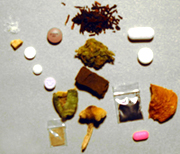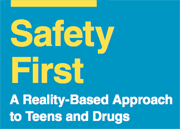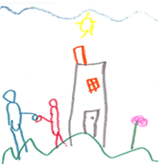 I have introduced Marsha Rosenbaum’s reality-based approach to teen drug use in an earlier posting. In the following selection from the same booklet, Safety First, published by the Drug Policy Alliance under her leadership, Rosenbaum suggests that while there are no easy answers for parents concerned with their teens’ safety and well-being, she can suggest a few guidelines.
I have introduced Marsha Rosenbaum’s reality-based approach to teen drug use in an earlier posting. In the following selection from the same booklet, Safety First, published by the Drug Policy Alliance under her leadership, Rosenbaum suggests that while there are no easy answers for parents concerned with their teens’ safety and well-being, she can suggest a few guidelines.
A Reality-Based Approach to Teen Drug Use (Part 1 – M. Rosenbaum)
 A very worthwhile booklet published by the Drug Policy Alliance helps parents evaluate and discuss strategies for protecting their teenagers from drug abuse. Since the original publication of Safety First: A Reality-Based Approach to Teens and Drugs, more than 300,000 copies have been distributed worldwide.
A very worthwhile booklet published by the Drug Policy Alliance helps parents evaluate and discuss strategies for protecting their teenagers from drug abuse. Since the original publication of Safety First: A Reality-Based Approach to Teens and Drugs, more than 300,000 copies have been distributed worldwide.
Author Marsha Rosenbaum* is director emerita of the San Francisco office of the Drug Policy Alliance, where she spearheaded DPA’s work on youth and drugs and created the Safety First booklet; it is available (free) online in multiple languages. The following is a selection from the booklet.
Purple Hair, Purple Heart (J. Schwartz)

I loved John Schwartz’s piece in today NYTimes Magazine (Purple Heart, 10.28.12). I was impressed by his readiness to first process with his son the latter’s motivations for, and possible repercussions from, dyeing his hair purple, and to then fully support his son once he decided to go ahead with the plan.
Notice (and admire!) how this parent did not concern himself (for even a moment) with how his son’s actions might reflect on him, the parent.
Empathy and the Brain
 ScienceDaily published a piece this week (Area of the Brain That Processes Empathy Identified, 10.24.12) about an international team led by researchers at Mount Sinai School of Medicine in New York that has shown, for the first time, that one area of the brain, called the anterior insular cortex, is the activity center of human empathy, whereas other areas of the brain are not.
ScienceDaily published a piece this week (Area of the Brain That Processes Empathy Identified, 10.24.12) about an international team led by researchers at Mount Sinai School of Medicine in New York that has shown, for the first time, that one area of the brain, called the anterior insular cortex, is the activity center of human empathy, whereas other areas of the brain are not.
Parenting as an Art (M. Riera)
 Michael Riera has written several excellent books on parenting teenagers, among them: Uncommon Sense for Parents with Teenagers and Staying Connected to Your Teenagers. Several of his concepts have made their way into the public discourse about raising teenagers: Consultant as opposed to Manger; Influence as opposed to Control; Parenting Teens as an Art, and so forth. The following excerpt from the former book touches on a few of these ideas.
Michael Riera has written several excellent books on parenting teenagers, among them: Uncommon Sense for Parents with Teenagers and Staying Connected to Your Teenagers. Several of his concepts have made their way into the public discourse about raising teenagers: Consultant as opposed to Manger; Influence as opposed to Control; Parenting Teens as an Art, and so forth. The following excerpt from the former book touches on a few of these ideas.
Your Children Are Not Your Children (K. Gibran)
 The following powerful poem by Khalil Gibran (1922) speaks to the notion of allowing our children to own their own dreams. We must guide and support them, while at the same time allowing them to discover their own ambitions, identity and purpose and to chart their own life paths.
The following powerful poem by Khalil Gibran (1922) speaks to the notion of allowing our children to own their own dreams. We must guide and support them, while at the same time allowing them to discover their own ambitions, identity and purpose and to chart their own life paths.
Competing Views on Competition (M. Richtel)
 Competitiveness. Hmmmm… Given my particular temperament, I am inclined to feel uncomfortable even when an Olympics athlete “wins” for having completed the race a fraction of a second before another. My inclination, too, would be to view competition as neither helpful nor constructive in promoting happiness and excellence, and to insist that it sidesteps the natural joy of non-measured, non-compared accomplishment. And yet….
Competitiveness. Hmmmm… Given my particular temperament, I am inclined to feel uncomfortable even when an Olympics athlete “wins” for having completed the race a fraction of a second before another. My inclination, too, would be to view competition as neither helpful nor constructive in promoting happiness and excellence, and to insist that it sidesteps the natural joy of non-measured, non-compared accomplishment. And yet….
If You Can Dream… (R. Kipling)
 In 1909 Rudyard Kipling (1865-1939), English short-story writer, poet and novelist (remembered mostly for his tales and poems of British soldiers in India and for his tales for children) published his now-famous poem “If” in a collection entitled Rewards and Fairies. The poem was not well-received, possibly because of its moralizing tone, its too-neat solution to life’s problems, and its orderly, rhymed verses at a time when Romantic poets were experimenting with freer forms of verse.
In 1909 Rudyard Kipling (1865-1939), English short-story writer, poet and novelist (remembered mostly for his tales and poems of British soldiers in India and for his tales for children) published his now-famous poem “If” in a collection entitled Rewards and Fairies. The poem was not well-received, possibly because of its moralizing tone, its too-neat solution to life’s problems, and its orderly, rhymed verses at a time when Romantic poets were experimenting with freer forms of verse.